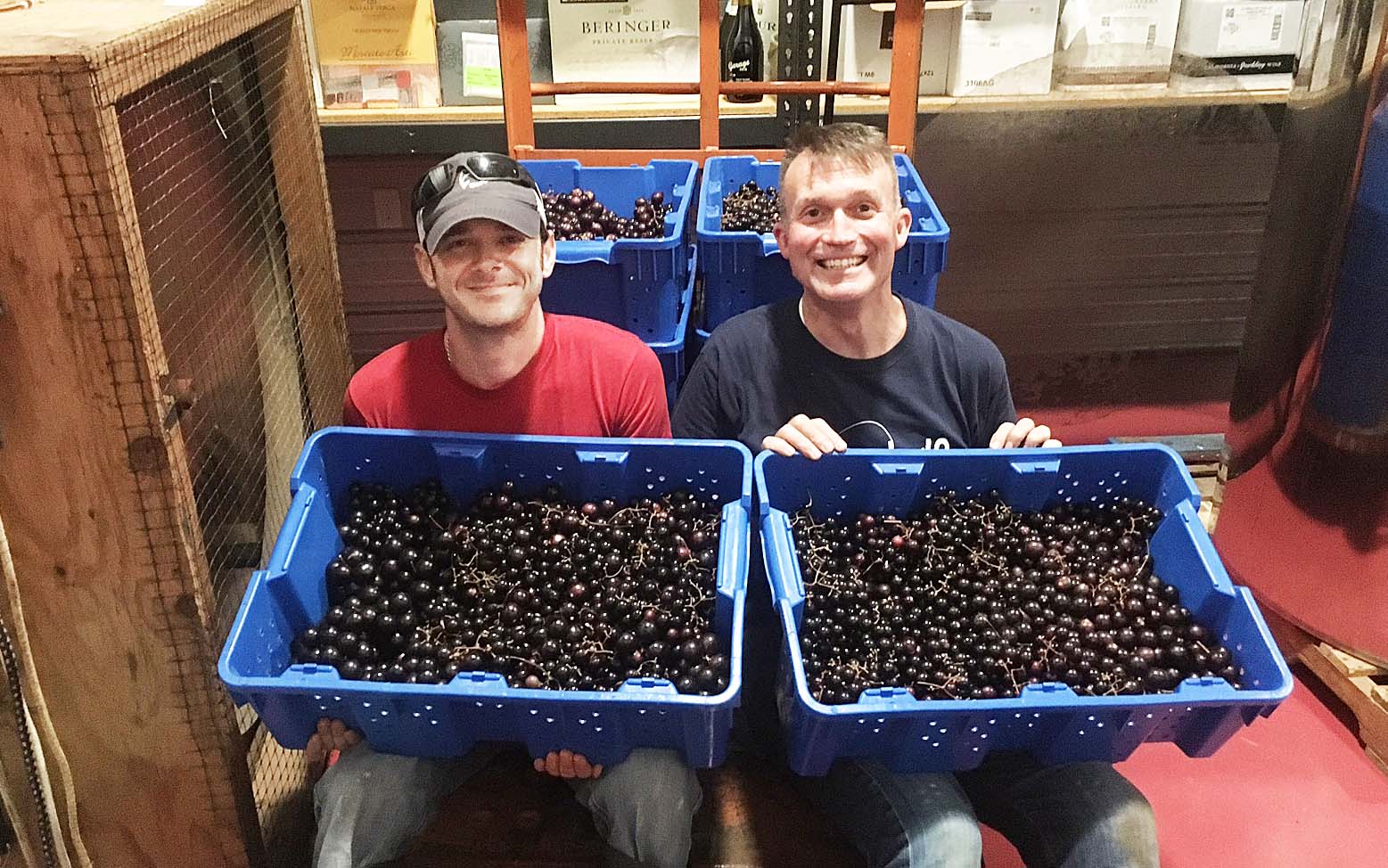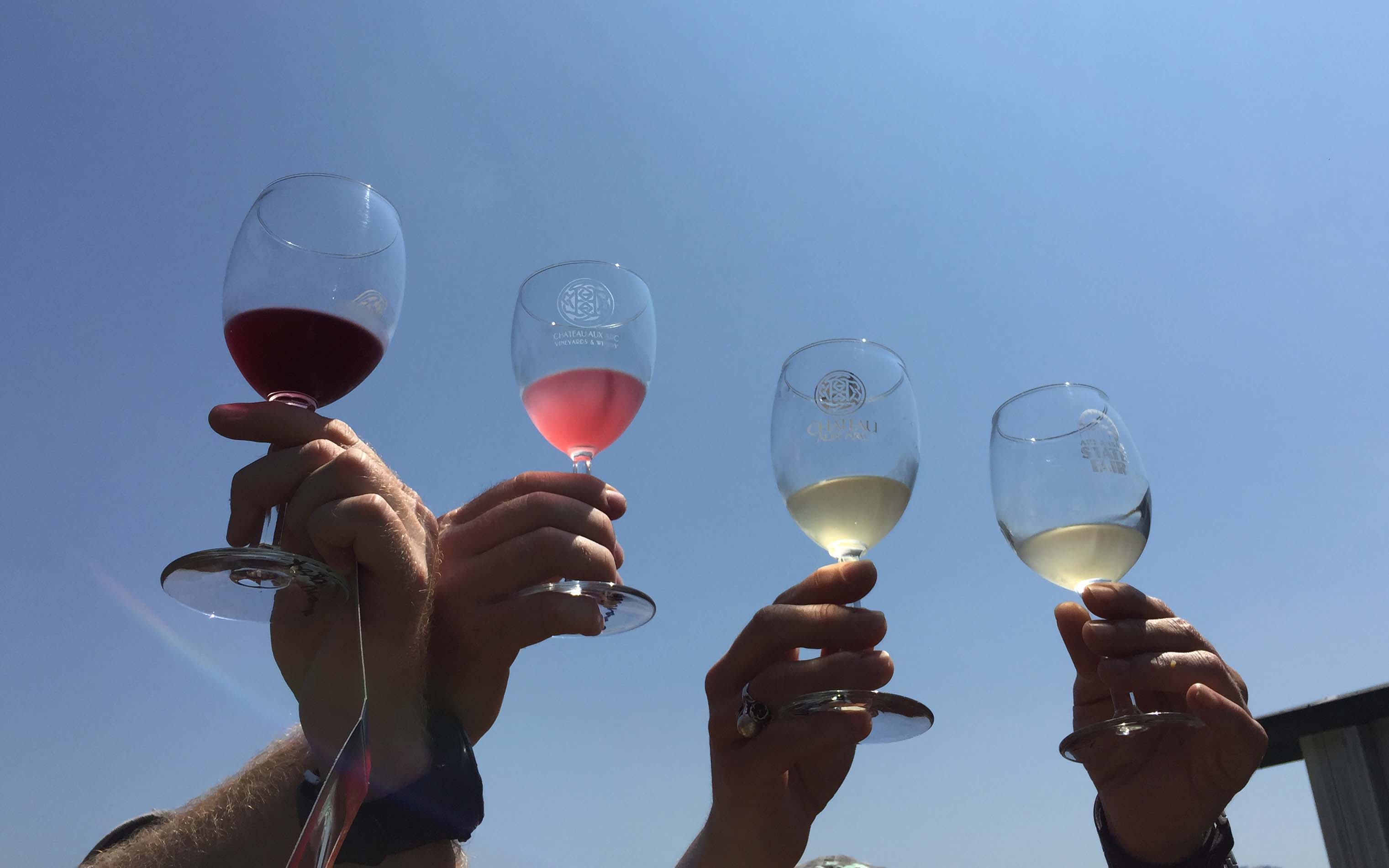Rusty Tractor Vineyards to call Little Rock home
January 15-21, 2018
By Becca Bona
From the ground to liquid warmth in a glass, the process of winemaking runs deep. Along that vein, a true wine aficionado wants to learn as much about the art as possible.
That’s what happened to Doug and Sheree Meyer when the two discovered their love for wine. Over seven years ago, they planted a few Muscadine vines on some property at the Southwestern edge of Little Rock, a short distance from the Rave Cinema.
Those few seeds were the catalyst for Central Arkansas’ newest winery – Rusty Tractor Vineyards. Think event venue, complete with picturesque views, multiple tasting rooms, and Arkansas wine available for sipping and sharing, just a short drive from downtown Little Rock.
All of this and more will be a reality for Central Arkansas in 2018.
Clark “Riley” Mason, winemaker and event manager, explains the namesake – “We’re actually named after a Rusty Tractor that’s on the property. In fact, you can see a pretty close representation of it on our logo.”
Mason, Little Rock born and bred, discovered his love for growing grapes during his time at the University of Arkansas at Fayetteville. With a degree in horticulture, his internship in the field influenced his career path.
“I met Audrey House who owns Chateau Aux Arc and I lived on her property above her tasting room,” he says. “In a small farm winery you’re involved with all aspects, so I was working the tasting room and I was in the cellar, too. I did a little bit of everything.”
After graduating in 2014, he found work at Springdale’s Sassafras Spring Vineyard, which had just opened. “I was working the tasting room, and that position soon evolved into event manager, so I was dealing with brides and bookings,” he explains.
When the owners of Rusty Tractor were looking for someone to help move their project along, Mason brought the perfect background to the table. His experience with events, working the tasting room, and growing grapes and producing wine made him a perfect fit. Plus, it was perfect timing.
“I was really missing my family,” he says, and was excited to return to Central Arkansas. “I’m excited about this project. This is a really great deal for Little Rock.”
The process of winemaking is not an easy one. It involves patience and skill, and a myriad of variable factors, like the weather. “Growing grapes in Arkansas is a full time job,” Mason explains, “We just can’t grow them like they can out in California.”
This past season marks the first harvest since Mason signed on with the team, a little over a year ago in November of 2016. So far, things are running relatively smoothly, as Mason adds, “I’m very satisfied with the way the grapes grew. […] It’s very difficult to grow traditional wine grapes in Arkansas, but thankfully you can plant to your needs with Midwest hybrids.”
Currently the vineyard is growing Vignoles, Traminette, Valvin Muscat, Chambourcin, Cynthiana (the state grape), Enchantment, and Muscadines.
Each grape offers a different experience to the palate. Vignoles produce fruity wine with the flexibility of tasting either sweet or dry, while Traminette produces a floral wine smelling of violets or roses. Chambourcin is a Midwest hybrid that produces a balanced full bodied red reminiscent of Merlot in style. Valvin Muscat, originally developed by Cornell, is not to be confused with Muscadine, but produces fruity, aromatic wines.
Cynthiana and Muscadine are native to the state, as are Enchantment. “Enchantment is a variety that the U of A developed. One of my professors was responsible for naming it,” says Mason.
Enchantment grapes were only recently released to the public, and were bred with the intent of making a red wine grape that can survive Arkansas’ growing conditions.
Mason was glad to bring his tie with the University in, and has plans to do it in other ways, as well. “I’m also going to do some table grapes the U of A developed,” he says, in hopes of adding additional flavor enhancements to Rusty Tractor’s wine offerings.
He has plans to plant Tempranillo in the spring, as well – “It does well in high humidity and unpredictable rainfalls,” he adds.
Growing the grapes, while slightly more than half the battle, is not all it takes to produce a solid glass of vino. There’s more to it than that.
Mason does a lot of monitoring and waiting, specifically measuring the grapes’ pH and acidity levels, until they are ripe for harvesting.
The grapes then go into the crusher to get mashed down. Temperature is important during the process – the cooler the better. Next, it’s off to the bladder press which pushes the juice away from the skin and seeds. The resulting mixture is drawn into a tank.
“Then I make any adjustments I might need to dial those numbers in to what I’m looking for,” Mason explains. “I inoculate with yeast and let fermentation take place. Ideally the process is like cooking a pot roast, low and slow.” Sometimes temperature spikes occur from the fermentation process, and Mason will work to cool the grapes back down again. In the broadest of terms, a white wine takes about six months, while a red takes longer – nine to 12.
Mason’s first round of winemaking took place amidst the unfinished tasting room. In the late spring/early summer of 2018, the winery will open its double French glass doors to wine aficionados and beginners, alike.
A large tasting room with sightlines to the vineyard will greet guests as they enter the vineyard’s main barn-like structure. A large patio off to the side of the main tasting room offers the perfect view of the vines, as the goal with the construction is to “bring the outside in.”
Mason is particularly excited for the result, as he thinks it’ll offer Little Rockers a little something different.
“If you go to any place in the spring or the early fall, patios are packed, and most of them are relatively small. I can’t think of a patio anywhere in Little Rock that’s as large as the one that we’re going to have. And of course, it’s subjective to weather and rain, but if it’s a nice spring afternoon, there’s going to be people on the patio,” he says.
The plan is to remain open through an auxiliary tasting room. That way, even if the main tasting room is rented out for an event, people can still experience Rusty Tractor Vineyards. “I don’t ever want to be closed to the public,” says Mason.
The space is equipped with everything caterers need to work an event, and while the winery plans to offer charcuterie alongside wine, they won’t operate as a separate restaurant.
Along with weddings, corporate outings, and other special events in which a winery makes the perfect backdrop, the team hopes to offer an educational component.
“We also want to bring in education. We’ll have the capability to have classes throughout the week,” Mason says. Think sommelier training and wine tastings for all levels.
Rusty Tractor doesn’t have a specific opening date yet, but they have a few events already on the books for May and June of 2018. Until then, stay up-to-date with the venue on their Facebook page: https://www.facebook.com/RustyTractorVineyards/.
PHOTO CAPTION:
Mason, left, and Jeffery Williams show off freshly picked grapes at Rusty Tractor Vineyards. The finished 2017 wines that readers can get excited to try will include Muscoles – a blend of Vignoles and Valvin Muscat, Traminette, Rojo Chambo – red Chambourcin, and MC2 – a blend of Muscadine, Cynthiana rosé, and Chambourcin rosé. The list comprises of all of Rusty Tractor’s estate grown wines and should remain fairly constant from year to year. (Photos Courtesy of Rusty Tractor Vineyards)




